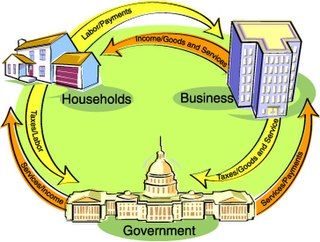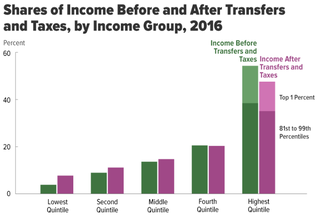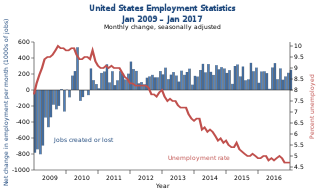
The European Economic Community (EEC) was a regional organisation that aimed to bring about economic integration among its member states. It was created by the Treaty of Rome of 1957. Upon the formation of the European Union (EU) in 1993, the EEC was incorporated and renamed the European Community (EC). In 2009, the EC's institutions were absorbed into the EU's wider framework and the community ceased to exist.

In economics, a recession is a business cycle contraction when there is a general decline in economic activity. Recessions generally occur when there is a widespread drop in spending. This may be triggered by various events, such as a financial crisis, an external trade shock, an adverse supply shock, the bursting of an economic bubble, or a large-scale anthropogenic or natural disaster. In the United States, it is defined as "a significant decline in economic activity spread across the market, lasting more than a few months, normally visible in real GDP, real income, employment, industrial production, and wholesale-retail sales". In the United Kingdom, it is defined as a negative economic growth for two consecutive quarters.

In economics, stagflation or recession-inflation is a situation in which the inflation rate is high, the economic growth rate slows, and unemployment remains steadily high. It presents a dilemma for economic policy, since actions intended to lower inflation may exacerbate unemployment.

A single market is a type of trade bloc in which most trade barriers have been removed with some common policies on product regulation, and freedom of movement of the factors of production and of enterprise and services. The goal is that the movement of capital, labour, goods, and services between the members is as easy as within them. The physical (borders), technical (standards) and fiscal (taxes) barriers among the member states are removed to the maximum extent possible. These barriers obstruct the freedom of movement of the four factors of production.

Protectionism is the economic policy of restricting imports from other countries through methods such as tariffs on imported goods, import quotas, and a variety of other government regulations. Proponents argue that protectionist policies shield the producers, businesses, and workers of the import-competing sector in the country from foreign competitors. However, they also reduce trade and adversely affect consumers in general, and harm the producers and workers in export sectors, both in the country implementing protectionist policies and in the countries protected against.

Paul Robin Krugman is an American economist who is the Distinguished Professor of Economics at the Graduate Center of the City University of New York, and a columnist for The New York Times. In 2008, Krugman was awarded the Nobel Memorial Prize in Economic Sciences for his contributions to New Trade Theory and New Economic Geography. The Prize Committee cited Krugman's work explaining the patterns of international trade and the geographic distribution of economic activity, by examining the effects of economies of scale and of consumer preferences for diverse goods and services.
The Era of Stagnation, meaning Stagnation Period, is a term coined by Mikhail Gorbachev in order to describe the negative way in which he viewed the economic, political, and social policies of the Soviet Union that began during the rule of Leonid Brezhnev (1964–1982) and continued under Yuri Andropov (1982–1984) and Konstantin Chernenko (1984–1985). It can sometimes be called the Brezhnevian Stagnation in English.

The Single European Act (SEA) was the first major revision of the 1957 Treaty of Rome. The Act set the European Community, an objective of establishing a single market by 31 December 1992, and codified European Political Cooperation, the forerunner of the European Union's Common Foreign and Security Policy (CFSP). It was signed at Luxembourg on 17 February 1986, and at The Hague on 28 February 1986. It came into effect on 1 July 1987, under the Delors Commission.

A liquidity trap is a situation, described in Keynesian economics, in which, "after the rate of interest has fallen to a certain level, liquidity preference may become virtually absolute in the sense that almost everyone prefers holding cash rather than holding a debt which yields so low a rate of interest."
Austerity is a set of political-economic policies that aim to reduce government budget deficits through spending cuts, tax increases, or a combination of both. Austerity measures are often used by governments that find it difficult to borrow or meet their existing obligations to pay back loans. The measures are meant to reduce the budget deficit by bringing government revenues closer to expenditures. This reduces the amount of borrowing required and may also demonstrate a government's fiscal discipline to creditors and credit rating agencies and make borrowing easier or cheaper as a result.

Real wages are wages adjusted for inflation, or, equivalently, wages in terms of the amount of goods and services that can be bought. This term is used in contrast to nominal wages or unadjusted wages.
Economic stagnation is a prolonged period of slow economic growth, usually accompanied by high unemployment. Under some definitions, "slow" means significantly slower than potential growth as estimated by macroeconomists, even though the growth rate may be nominally higher than in other countries not experiencing economic stagnation.

Income inequality in the United States is the extent to which income is distributed in an uneven manner among the American population. It has fluctuated considerably since measurements began around 1915, moving in an arc between peaks in the 1920s and 2000s, with a 30-year period of relatively lower inequality between 1950–1980.
Employment protection legislation (EPL) includes all types of employment protection measures, whether grounded primarily in legislation, court rulings, collectively bargained conditions of employment, or customary practice. The term is common among circles of economists. Employment protection refers both to regulations concerning hiring and firing.

The Great Recession was a period of marked general decline (recession) observed in national economies globally that occurred between 2007–2009. The scale and timing of the recession varied from country to country. At the time, the International Monetary Fund (IMF) concluded that it was the most severe economic and financial meltdown since the Great Depression.

The Lost Decade or the Lost 10 Years was a period of economic stagnation in Japan from about 1991 to 2001, caused by the Japanese asset price bubble's collapse in late 1991. The term originally referred to the years from 1991 to 2000, but recently the decade from 2001 to 2010 is often included so that the whole period is referred to as the Lost Score or the Lost 20 Years. Since 2020, it was proposed to also include the decade from 2011 to 2020 as the Lost 30 Years (失われた30年). From 1991 to 2003, the Japanese economy, as measured by GDP, grew only 1.14% annually, while average real growth rate between 2000 to 2010 was about 1%, both well below other industrialized nations. Later, the 2008 Great Recession, 2011 Tōhoku earthquake and tsunami and COVID-19 pandemic in Japan has greatly impacted the Japanese economy in a negative way.

Unemployment in the United States discusses the causes and measures of U.S. unemployment and strategies for reducing it. Job creation and unemployment are affected by factors such as economic conditions, global competition, education, automation, and demographics. These factors can affect the number of workers, the duration of unemployment, and wage levels.

Manufacturing in the United States is a vital sector. The United States is the world's third largest manufacturer with a record high real output in Q1 2018 of $2.00 trillion well above the 2007 peak before the Great Recession of $1.95 trillion. The U.S. manufacturing industry employed 12.35 million people in December 2016 and 12.56 million in December 2017, an increase of 207,000 or 1.7%. Though still a large part of the US economy, in Q1 2018 manufacturing contributed less to GDP than the 'Finance, insurance, real estate, rental, and leasing' sector, the 'Government' sector, or 'Professional and business services' sector.
In economics, secular stagnation is a condition when there is negligible or no economic growth in a market-based economy. In this context, the term secular means long-term, and is used in contrast to cyclical or short-term. It suggests a change of fundamental dynamics which would play out only in its own time. The concept was originally put forth by Alvin Hansen in 1938. According to The Economist, it was used to "describe what he feared was the fate of the American economy following the Great Depression of the early 1930s: a check to economic progress as investment opportunities were stunted by the closing of the frontier and the collapse of immigration". Warnings of impending secular stagnation have been issued after all deep recessions since the Great Depression, but the hypothesis has remained controversial.

Job creation and unemployment are affected by factors such as aggregate demand, global competition, education, automation, and demographics. These factors can affect the number of workers, the duration of unemployment, and wage rates.











